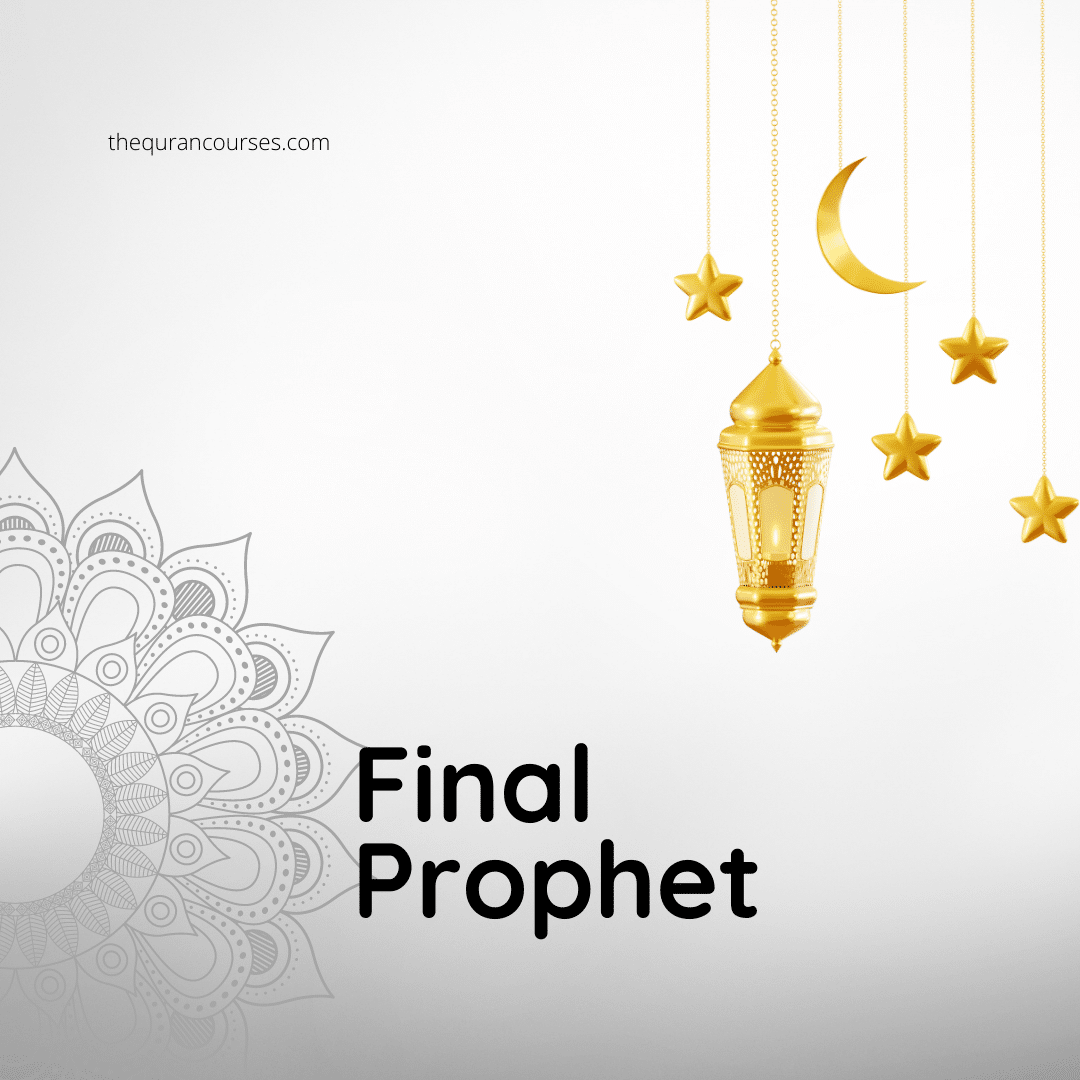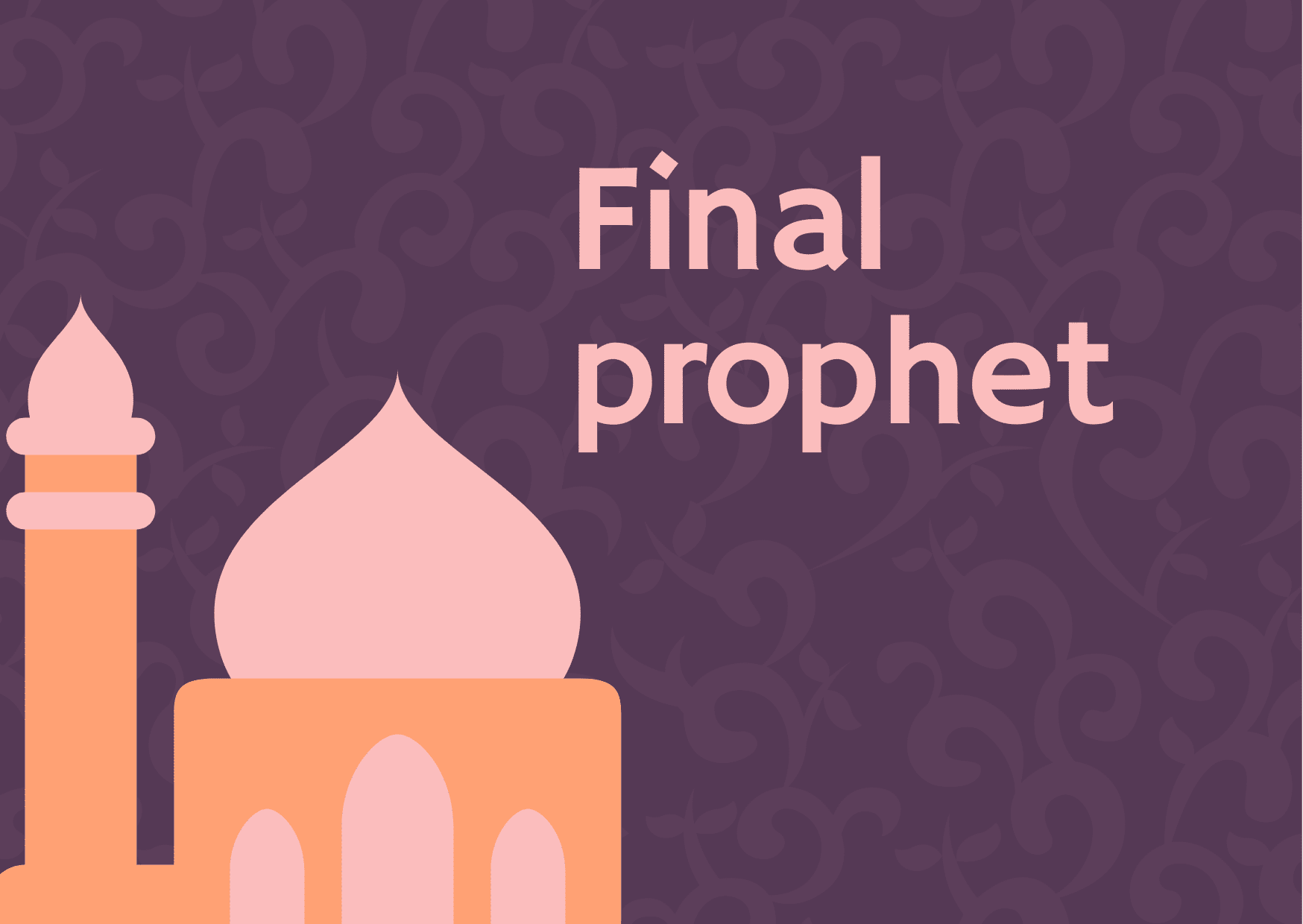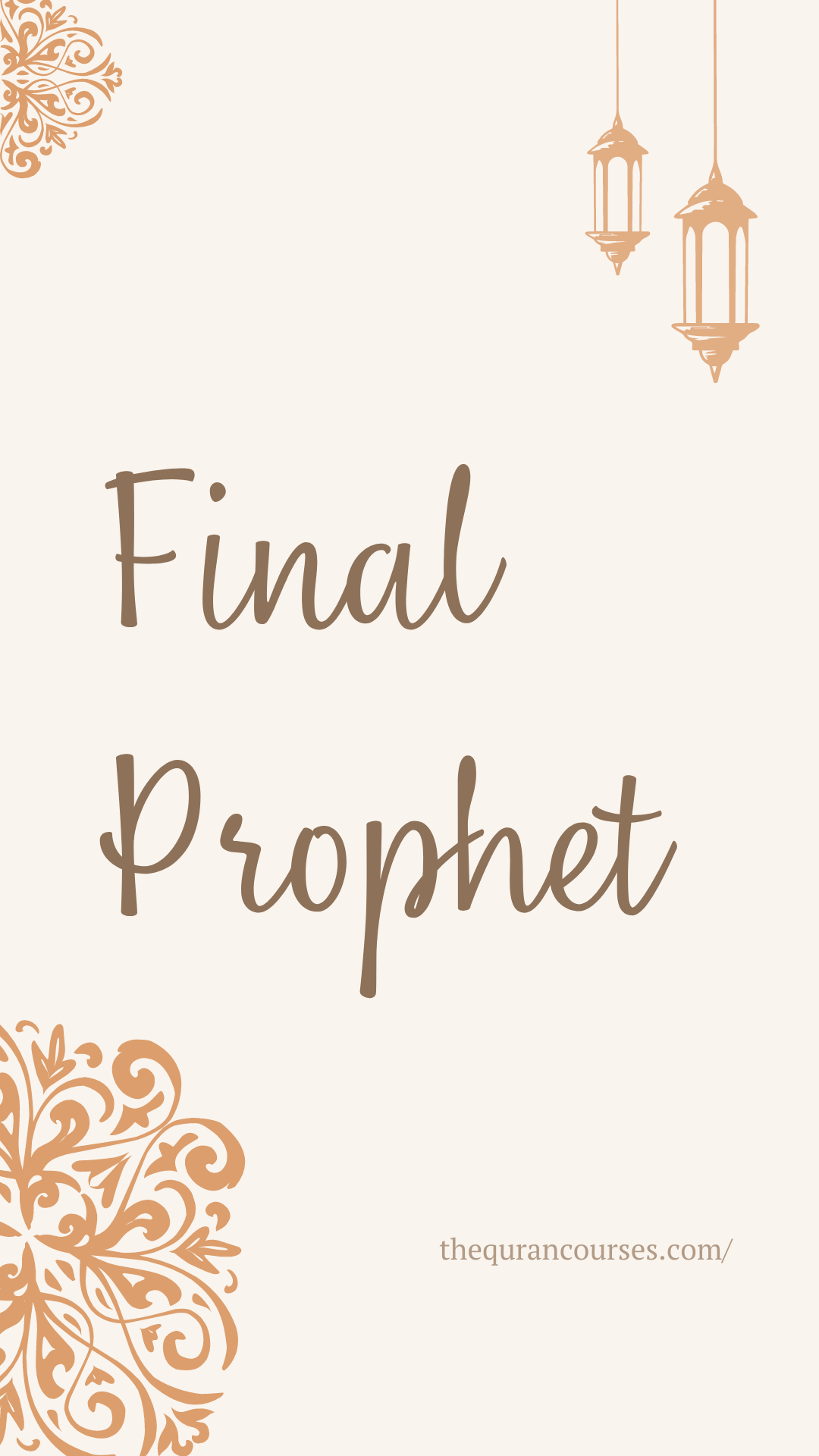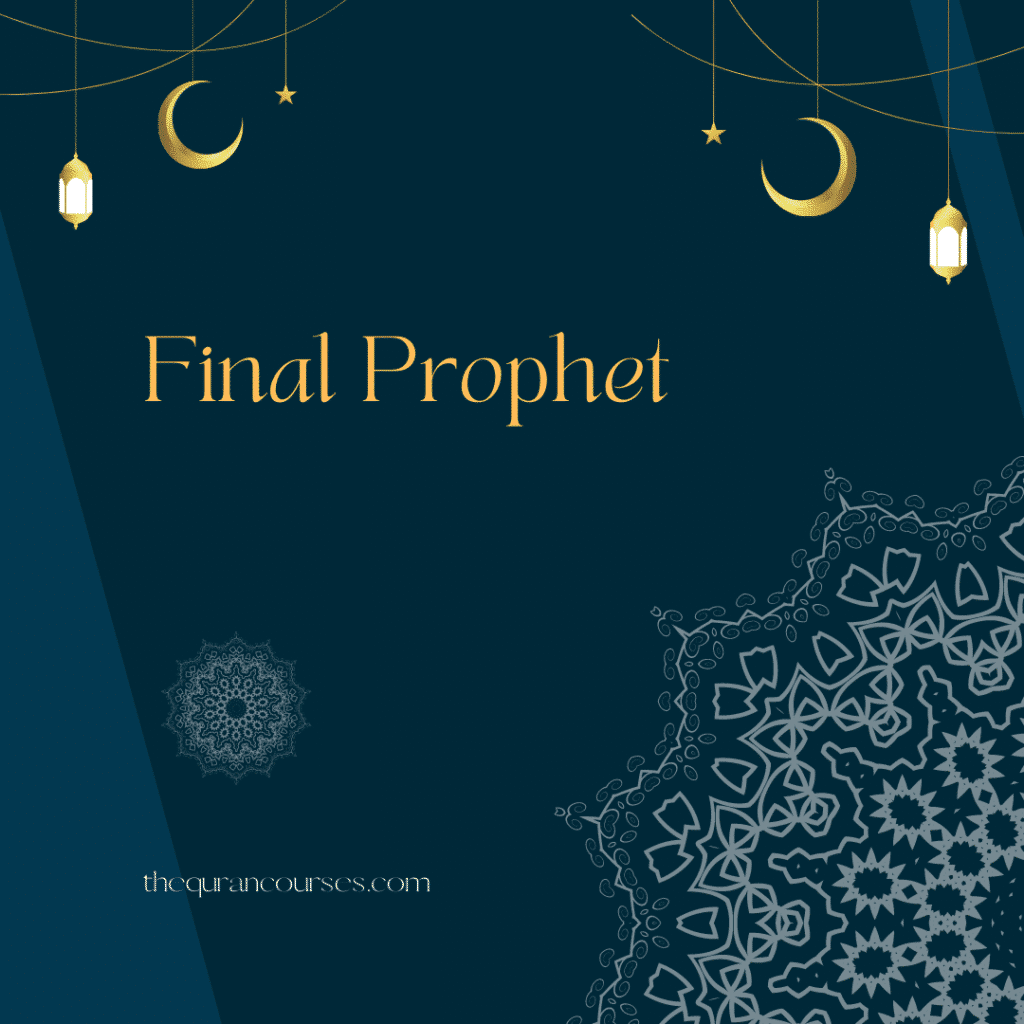The final Prophet of the heavenly prophets is the Holy Prophet Muhammad (S). God will send no other prophet after His Eminence. From the outset of his mission, the Prophet of Islam identified himself as the seal of the prophets, and the Muslims embraced him as such. In the Islamic context, the question of prophethood’s finality is seen as a significant issue that does not require proof.
Final prophet
The Holy Quran, as well as books of tradition, mention finality. In the Quran, it is stated:
مَا كَانَ مُحَمَّدٌ أَبَآ أَحَدٍ مِّن رِّجَالِكُمْ وَلَكِن رَّسُولَ اللَّهِ وَخَاتَمَ النَّبِيِّينَ وَكَانَ اللَّهُ بِكُلِّ شَىْءٍ عَلِيماً
“Muhammad is not the father of any of your men, but he is the Apostle of Allah and the Last of the prophets, and Allah is cognizant of all things.” (33:40)
If the Arabic word “KH-T-M” is pronounced with the vowel ‘I’ on the ‘T,’ as some reciters have done.
It denotes someone who completes a task, indicating that The Holy Prophet Muhammad (S) is the last of the prophets.
When spoken with the vowel ‘A’ on the letter ‘T,’ however, it implies anything that comes to an end.
Because they are placed after a letter and signal its end, they are also known as rings and seals.
According to the second alternative, the Holy Prophet (S) is also the Final Prophet since he is introduced as a seal after the letter of prophethood.
Today, the Islamic community is still divided into Sunni and Shi’i branches.
All four caliphs are revered by Sunnis, whereas Shi’is view ‘Ali as the first spiritual leader.
Differences in worship and political and theological ideas have evolved from the schism between these two sects.
Sunnis are the majority and inhabit the majority of the Muslim world. In contrast, Shi’is are primarily found in Iran and Iraq, with significant concentrations in Bahrain, Lebanon, Kuwait, Turkey, Pakistan, and Afghanistan.
Muhammad: The Prophet

Muhammad was born in the year 570 C.E. at Mecca.
He was orphaned when he was young; his father died before he was born, and his mother died six years later.
Muhammad was raised by his grandfather and subsequently his uncle for the rest of his childhood.
As a result, no single individual influenced Muhammad’s views and approached to life from an early age.
He worked as a shepherd as a child. “All the prophets of God were shepherds,” he subsequently noticed, which was noteworthy.
Muhammad then took up the most important Arab activity of commerce, and he was well-liked for his honesty and integrity.
Despite his intellect, he couldn’t read or write, and he couldn’t create poetry, which is a staple of Arab culture. As a result, the notion that Muhammad wrote the Quran is false.
God states in the Quran to this effect:
“[Muhammad] does not speak from his desire. The Quran is nothing less than a revelation that is sent to him” (53:3-4).
Early Years: The life of the Final Prophet
Around 570 A.D., Muhammad was born into the Quraish, Mecca’s most influential clan.
The Quraish’s authority was derived from their success as traders.
The Quraish were able to control commerce throughout the west coast of Arabia, north to Syria, and south to Yemen.
Mecca serves as a crossroads for several commercial routes.
Mecca was home to two immensely revered polytheistic cults whose gods were said to safeguard the city’s prosperous trade.
After several years as a trader, Khadija, a wealthy widow, employed Muhammad to oversee the safe transit of her caravans to Syria.
They married in the end.
Revelations from God
The final prophet Muhammad began experiencing visions and hearing voices when he was forty.
He would meditate on Mount Hira, near Mecca, search for clarity.
The Archangel Gabriel (Jibra’il in Arabic) came to him on one of these instances and told him to recite “in the name of [you’re] lord.”
This was the first of many revelations that formed the foundation of the Qur’an, Islam’s sacred book.
These early revelations indicated the presence of a single God, opposing the pre-Islamic Arabian Peninsula’s polytheistic beliefs.
Initially taken aback by the seriousness of what was revealed to him, Muhammad found unflinching support in his wife and gathered followers over time.
His passionate monotheistic preaching angered many Meccan businesspeople.
They feared that as a result, commerce, which they believed was protected by pagan gods, would suffer.
From that moment on, Muhammad was ostracised in Mecca.
For a time, Muhammad was shielded from persecution by his wife’s influence and the standing of his uncle, Abu Talib, the clan’s leader.
However, once they died, Muhammad’s condition in Mecca deteriorated.
Final Prophet: Hijra

Muhammad’s and his allies’ only hope of survival was emigration.
In 622, they traveled to Medina, another oasis town, where religious freedom was promised.
The hijra, or departure from Mecca to Medina, marks the Islamic or Hijri calendar’s beginning.
Islam’s Message is Being Disseminated
At Medina, where he created a strong congregation around the new faith, Muhammad continued to receive heavenly revelations.
The struggle with the Quraish raged on until Mecca finally succumbed after several years of bloodshed.
Soon after, Muhammad and his companions came to the city and conquered it, smashing all of the city’s pagan gods and spreading their belief in a single God.
Conclusion

About The final prophet: Ascension and Night Journey:
For ages, accounts of the Final Prophet Muhammad’s ascent (Mi’raj ) have captivated the imaginations of authors and painters.
While the Prophet was sleeping, the Archangel Gabriel appeared to him and took him on a journey.
Muhammad rode from the Ka’ba in Mecca to the “Farthest Mosque,” which Muslims believe to be the Al-Aqsa Mosque in Jerusalem, mounted on the holy horse Burqa.
He ascended to the skies, where Gabriel led him through Paradise and Hell, and finally came face to face with God, where he prayed with other prophets such As Moses, Abraham, and Jesus; he ascended to the heavens, where Gabriel took him through Paradise and Hell before meeting God. Following that, he returned to Earth to continue spreading the Islamic faith.
Read More: why do women wear hijab? Amazing info you should know




Asc
My name Trit Mohammed Omar I was from Ethiopia 🇪🇹
Asc
Early Trit Mohammed Omar now ይብራህኪሮስ መለስ ዜናዊ was born May 2, 1983 G.C in Eastern of Ethiopia at Bisidimo, I received 1-8 at Bisidimo Primary School, 9-12 at Harar Senior Secondary School, join Bahir Dar University and Cut his study at second years student, next by the help of Allah graduated Diploma in Accounting from Haramaya University and Digree in Tax and Customs Administration from Ethiopia Civil Service University and More or less Six years work experience in Oromia Revrnue Authority, Trit Mohammed Omar is the Only men who create income tax brackets that are regulated by Article 54(3) of the constitution of Ethiopia .
Obey Allahobey messenger of allah and those in authority among you, if you believed in Allah and last day. If disagreement over anything refer ro allah/Qur’an/ and his messenger /Hadith/.[Qur’an 4:59]
and slso prophet Mohammed S.A.W says that”Whoevey obeys me, obeys Allah, Whoever disobeys me, disobeys Allah”[Sihahi al-bukkar 7131]
The 75 good Manners (Commandements) in Qur’an ( Which is a combination of Qur’an 22:75 and Qur’an 3:159 which is in Qur’an Allah SWT say ” We chosen a Messenger from Angles and human being indeed Allah is All-hearing and All-Seeing.[Qur’an 22:75] Which is about Donation of Tax – Deductible in New England Mosque or Church [John 3:27-30] Context it Announced Proclamation no.175/2012 creating a progressive income tax brackets and Effective tax rate that are regulated by Article 54(3) of the Constitution of Ethiopia.
Trit Mohammed Omar and Semhal Meles Zenawi
God State in Qur’an to this Effect. [Qur’an 53:3-4] Which is About Allah chosen Messenger from Angles and human beings. Indeedd Allah All-Knowing and All-Seeing. [Qur’an 22:75 and Qur’an 3:159] Context about Tax Deductible Mosque or Church new England! [ John 3:27-30] Reconcile to Proclamation no.175/2012.
Trit Mohammed Omar and S3mhal Meles Zenawi